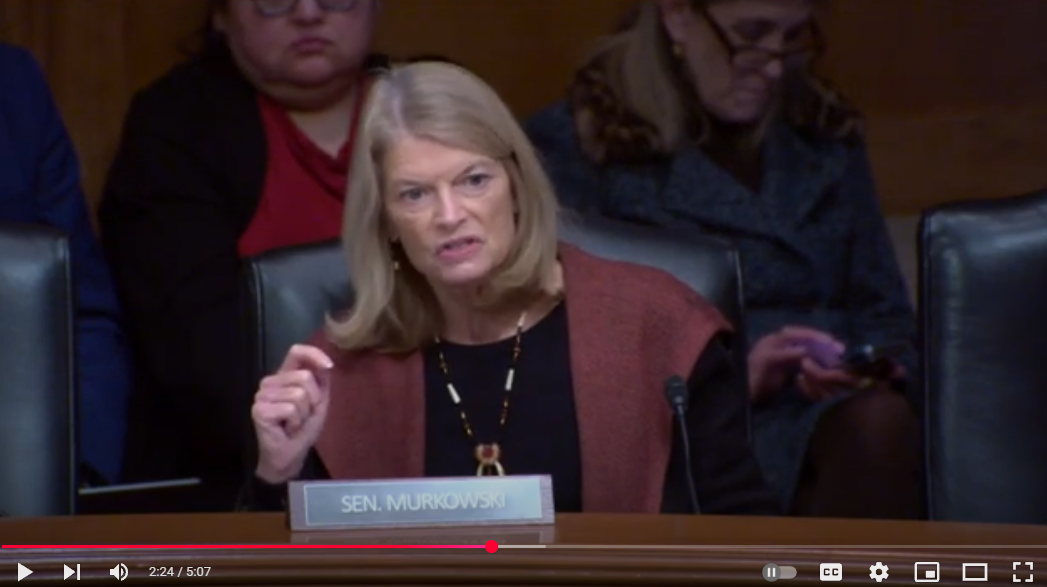Murkowski Engages with Secretary of Labor Nominee During Confirmation Hearing
Washington, DC – Today, U.S. Senator Lisa Murkowski (R-AK) engaged with Secretary of Labor nominee, former Congresswoman Lori Chavez-DeRemer, during a Health, Education, Labor, and Pensions (HELP) Committee hearing. Senator Murkowski articulated Alaska’s workforce demands, and received a commitment from Chavez-DeRemer to work to address these needs at the federal level.
“Alaska’s key industries require distinct personnel needs in order to keep up with constantly evolving environments,” said Senator Murkowski. “If confirmed, I look forward to working with former Congresswoman Chavez-DeRemer to ensure Alaska’s workers and communities have the support they need.”

Click here to watch Senator Murkowski’s full remarks.
The full transcript of Murkowski’s comments is below.
FULL TRANSCRIPT
Senator Murkowski: Welcome to the committee, I enjoyed our conversation. We had a chance to talk a little bit about the Alaska workforce. I'm looking at an article that just came out, and it cites the Alaska State Department of Labor and Workforce Development, looking at Workforce statistics in 2023. We don't have 2024's numbers yet, but right now non-resident workers in our state make up 23.5% of the workforce. That's a lot. It means we get folks that come to us from other states. When you have 82% of your communities that are not connected by road, you can't move as a worker from one village to another village unless you're willing to pay several hundred dollars for each leg of your airplane ticket to get you to another community for work, so we rely on out-of-state workers.
In the oil and gas industry 37.4% of the workers were non-residents. In the mining industry, non-residents accounted for 41.6%. The seafood processing sector, significantly one of our largest employment and economic drivers in the state, produces more than $5 billion in economic activity, so this is big for us. What is even bigger is that in 2023, 82.8% of the workers were non-resident. We process our seafood in small coastal communities. If they have a population at all, it is maybe 500 people. You cannot run a seafood processing industry when you don't have the workers.
So, back to the comment that was made earlier about H-2Bs. This is significant for us. Senator Collins asked about your commitment to issue supplemental visas in a timely manner but also to the maximum extent allowable. You do have that discretion. You've indicated that you're going to work to that. I'm going to ask you to look specifically to the seafood processing sector out of all the sectors that are out there. My friend from Virginia knows well- seafood is more truly seasonal than so many other sectors, but right now we are competing for these H-2Bs with other sectors like landscapers. Last I checked, you can do landscaping 365 days practically in most parts of the country. The seafood sector in Alaska- you're looking at an industry during the summer, at least when it comes to Salmon, that is literally an 8 to 10-week season. We are the poster child for seasonal workers. I need to know that you will not only support the H-2B visa program but commit to working with me on legislation to exempt Seafood processors from the H-2B visa caps. This is something that we've been trying to work for years. Basically, we've been stalled out by big labor that is so concerned that we are not offering these jobs to people across the country. You can't get an H-2B visa until you have demonstrated all the efforts that you have made to seek US workers and that none are coming to you. We had the conversation in my office. It's important to state it here publicly how significant it is, and I need your assurance that you're going to work with us and work with your partners within Homeland Security as well on this critical issue for us.
Chavez-DeRemer: Yes ma'am, I will commit to working with you specifically on this issue.
Senator Murkowski: Thank you, I appreciate that. There is a lot of conversation about apprenticeship, so I'm not going to revisit that. Although, I did just come from a meeting with the head of the Alaska Military Youth Academy who was talking about the benefits of going from that exceptional program to hand-in-glove with the Alaska Works Training Program. These young people can see the benefits right then and there. Maybe I want to be a welder, maybe I want to be a carpenter. You take them hand-in-hand. Last thing I'm going to raise is something in a conversation just yesterday with the head of the building trades. We're talking about childcare because we can talk about a workforce, but people can't get to the workforce if they can't afford childcare. I would hope that you're going to prioritize families in the workplace and support incentives for on-site childcare.
Chavez-DeRemer: Yes ma’am.








